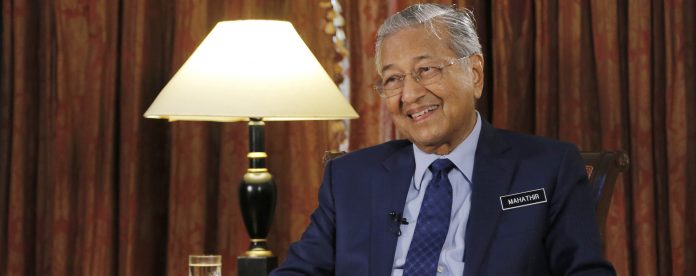In burying the hatchet, with his one time foe, Anwar Ibrahim, Malaysian PM Mahathir Mohammad exhibited immense pragmatism. An arrangement has been worked out, according to which Mahathir would step down and pave way for Ibrahim
Mahathir has been equally pragmatic in his approach towards China, while taking some tough decisions. All eyes have been on Mahathir’s decision to scrap two major Chinese projects — US$20 billion East Coast Rail Link and two gas pipeline projects worth US$2.3 billion. The Malaysian PM cited the country’s ever increasing debts, as a significant reason for the cancellation of the projects. Interestingly, the cancellation of the two projects came at a time, when Beijing was trying to promote BRI and celebrating the fifth anniversary of the plan.
The scrapping of the projects, came before Mahathir’s China visit, and during his visit he explained the reasons for the same to the Chinese leadership.
On August 27, 2018 the Malaysian PM also made it clear, that no foreign citizens will be allowed to live in the Forest City Project, being developed by a Country Garden Holdings. The reason Mahathir gave for this decision was the fact, that these flats were being developed for foreigners, not Malaysians. Through his astute handling of China, Mahathir has proven two things.
First, if one does not blindly follow US diktats, it is not essential to move towards the Chinese orbit. In the past, the Malaysian PM was not known for being Pro-US. In fact, while addressing the US-Malaysia Forum in 2003, he launched a scathing attack on Washington, for its approach towards Afghanistan and Iraq, this ruffled many feathers. The US took strong umbrage to this speech.
At the same time, Mahathir a hard nosed realist, is not opposed to globalization per se. He is a believer in free markets, and trade and this was clearly evident from one of his first statements he made in a press conference:
“Malaysia wants to have access to all the markets of the world, whether east or west, whether communist or non communist, it is of no concern to us,”
Second, to keep a good relationship with China, it is not essential to kowtow before Beijing as many ASEAN, and South Asian countries have done. During his China visit, The Malaysian PM did underscore the relevance of the bilateral relationship and fervently pitched for giving a fillip to economic cooperation based on economic gains. On the other hand, he did not shy away from alluding to Chinese domination, and spoke about a ‘new version of colonialism’ being promoted by China. Beijing did not react strongly to the Malaysian PM’s remarks, though the media did not mention these in coverage of his visit. The joint statement referred to the need for a long-term vision, and the need for building greater political trust, and a relationship based on equality. Both these points highlight Mahathir’s unequivocal commitment to having a bilateral relationship based on mutual respect.
Mahathir and ASEAN
It would also be pertinent to point out, that Mahathir has changed the dynamics within ASEAN. For long, ASEAN was looked from the prism of two camps, Pro-US and Pro-China, with the triumph of Trump, even though, there has been endless talk of ‘Indo-Pacific’, countries within ASEAN have begun to veer towards China as a consequence of Trump’s economic isolationism. Many of them, who may have dissonance with Beijing, are part of the Belt and Road Initiative. Mahathir’s tough stance has a very strong message that being excessively submissive or dependent upon any one power makes no sense. There is a clear scope for Mahathir to thus take a greater leadership role not just in ASEAN, but of those countries where debts are mounting as a consequence of the Belt and Road Initiative.
India and Malaysia: Space for common ground
India too should look at strengthening ties not just within the framework of bilateral issues, or engagement with ASEAN, but also on strategic issues. During his previous tenure, Mahathir took a stand on a number of global issues, and he is likely to do the same during his current tenure as well. On certain economic and geo-political issues it would make sense for New Delhi to find common ground with Mahathir, and deepen economic and strategic ties.
Mahathir by scrapping Chinese projects in Malaysia, has brought to the fore the deficiencies, of the Belt and Road Initiative. His handling of Beijing, where he has laid emphasis on a bilateral relationship, based on equality is significant. At a time, when there is talk of the need for a cohesive narrative on important global issues emerging from Asia, Mahathir’s tough stance against China is important. It sends a clear message, that an Asian narrative does not have to be China centric.

Tridivesh Singh Maini is a New Delhi based analyst interested in Punjab-Punjab linkages as well as Partition Studies. Maini co-authored ‘Humanity Amidst Insanity: Hope During and After the Indo-Pak Partition’ (New Delhi: UBSPD, 2008) with Tahir Malik and Ali Farooq Malik. He can be reached at [email protected].


